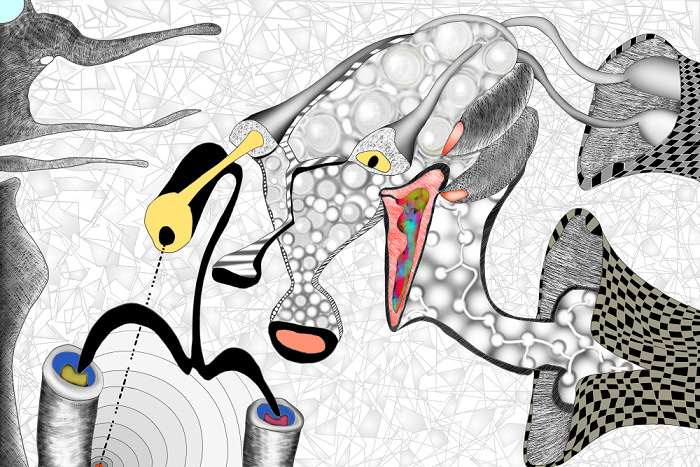
“The Critic:Risking an Eye”
"The Critic. Risking an Eye" was created using only "Painter"
(Metacreations), Sept - November 2003.
Print: Piezo-Print on Somerset Velvet Size: Paper: 56x76 cm, Picture: 38x56 cm Copies: 25, numbered and signed, and 5 artist's copies (I-V) Price: 475.‒ Euros Artist: Björn Dämpfling
„The Critic: Risking an Eye“ was not the result of a ungentle
clash with art critics. It originated from the way in which the
organizers of an art festival, that included a competition, started to
change their rules by implementing year by year a catalog of more and
more questionable criteria, to be heeded in order to have a chance.
This fully digital image seems to be my ironic answer to their trying
to squeeze digitally produced art into criteria that demanded “digital
art” not only to be “digitally produced, mere application, but also to
be critically reflective of the technique itself” Of course this was
meant as a value judgment, stipulating that “merely using digital
production” technique will basically give conventional, not
“innovative” aesthetic results. A “drawn” answer to this meaningless
phrase is given with the background of this image: What looks like a
fully computer generated structure is pure handwork no computer is
able to create this way. A practical antithesis to the fiction
an algorithm may produce “art” by itself. But whatever machines
do, generating poems or paintings, one inevitable
truth shows: Since art without humans that select is a
brainless endeavor in a literal sense, art can only be defined
by a human selector, risking an eye, making art by
selection of even completely machine made results, like a
photograph may select a piece of nature, turning it into art.
Machines have no doubt the capability to put out beautiful
images, for example, fractals in unlimited numbers and if
someone wants to call this “machine art” one could only
point to the unlimited boredom setting in sooner or later.
Concerning the potential of human creativity truth is: software
or thought out concepts or natural processes can just
deliver the material to work with and as long as androids
are science fiction and computers have essentially different
capabilities compared with human brains, this holds without
any qualification. Creativity can only develop in a conscious
handling of computer generated structures, which I am using
myself without prejudice: As material to work with as
well as a counterpoint to my own human creativity. This
way a conscious and thoughtful acting offers indeed a great
potential for exploring and combining in a new manner.
Playing with generated structures gives an artist a chance
to find new elements and to select good ones. But now a
days “artist-cyborgs” or “self programming aesthetics” will
be unmasked by our computer kids as what they are:
“done by sleight of hand”. In addition people who know a
bit about shipping may realize something, but since it is of
zero importance for the image as a piece of art, I will leave
it there. Second prize at the Donnie-Award 2004 of the MOCA/New
York

